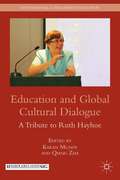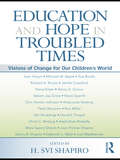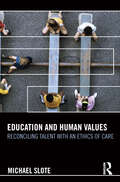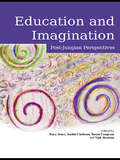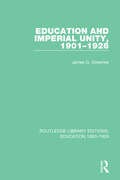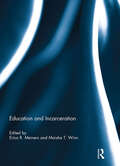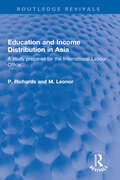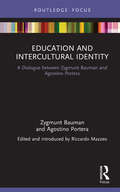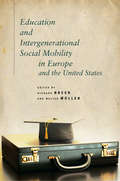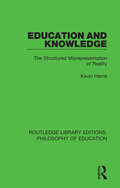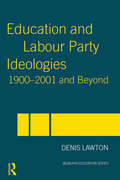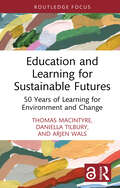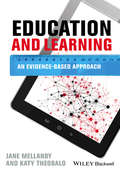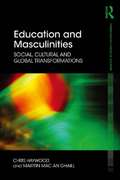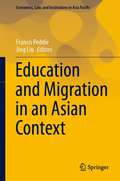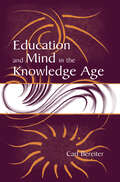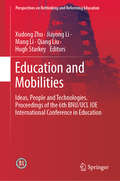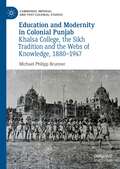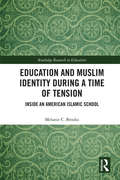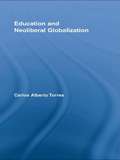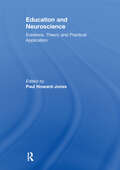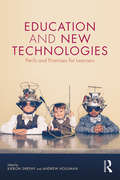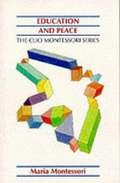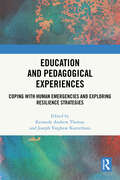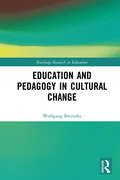- Table View
- List View
Education and Global Cultural Dialogue
by Qiang Zha Karen MundyCultural and spiritual resources are arguably essential to achievement of educational goals, both as economic and political initiatives and as human rights. This book addresses questions surrounding education and inter-cultural understanding in a broad global framework.
Education and Hope in Troubled Times: Visions of Change for Our Children's World (Sociocultural, Political, and Historical Studies in Education)
by H. Svi Shapiro"Progressive educators have always been better at critique than at possibility. This book promises not to ignore critique, but to favor possibility. It is most rare and greatly welcomed." Richard Quantz, Miami University "The editor argues that in a material world, depicted by consumerism, spiritual nihilism and conspicuous consumption, there is need to offer a new vision and direction in education that would promote a more harmonious, holistic values-oriented schooling that transforms persons into moral beings, who care for others…. In terms of innovative ideas and approaches to pedagogy and theorizing about schooling, this volume is at the top of pedagogical discourses and thinking." Joseph Zajda, Australian Catholic University (Melbourne Campus) Education and Hope in Troubled Times brings together a group of the best and most creative educational thinkers to reflect on the purpose and future of public education. These original essays by leading social and educational commentators in North America attempt to articulate a new vision for education, especially public education, and begin to set an alternative direction. This is a time of crisis, but also of renewed possibility—one that offers the opportunity to radically reconsider what is the meaning of education for a generation that will bear the brunt of grappling with the extraordinary dangers and challenges we confront today. At its core this volume questions what will it mean to be an educated human being in the 21st century compelled to confront and address so much that threatens the very basis of a decent and hopeful human existence. Carrying forward a project of redefining and reshaping public discourse on education in the U.S., it is a critical catalyst and focus for re-thinking public policy on education.
Education and Human Values: Reconciling Talent with an Ethics of Care
by Michael SloteTwo of our greatest educational theorists, John Dewey and Nel Noddings, have been reluctant to admit that some students are simply more talented than others. This was no doubt due to their feeling that such an admission was inconsistent with democratic concern for everyone. But there really is such a thing as superior talent; and the present book explains how that admission is compatible with our ideals of caring (and democracy). Traditionalists confident that some disciplines are more important than others haven’t worried that that way of putting things threatens to make those who are excluded feel quite bad about themselves. But an ethics of care can show us how to make these differences much less hurtful and more morally acceptable than anything that has been proposed by traditionalists. So the present book offers a middle way between the denial of the reality of superior talents and an insensitive insistence on that reality. It argues that care ethics gives us a way to do this, and it bases that claim largely on the promise of such an ethics for moral education in schools and in homes. It is argued on psychological grounds that caring can only take place on the basis of empathy for others, and the book shows in great detail how empathy can be encouraged or develop in school and home contexts. Other approaches to moral education—like Kantian cognitive-developmentalism and Aristotelian character education—can’t account for (increasing) moral motivation in the way that an emphasis on the development of empathy allows. And in the end, it is only students educated via care ethics who will be sensitive to one another in a way that largely undercuts the negative psychological impact of educational institutions and practices that acknowledge the greater talents or creativity that some students have.
Education and Imagination: Post-Jungian Perspectives
by Raya A. Jones Austin Clarkson Sue Congram Nick StrattonHow can Jungian psychology be applied to the educational setting? Education and Imagination explores the application of Jungian perspectives in educational settings, establishing the creative imagination as a critical and necessary feature of learning throughout the lifespan. The book identifies various facets of applying contemporary Jungian thought to the issue at hand, in chapters that range from scholarly critiques to practical project reports. This straightforward and accessible resource addresses issues at the interface of education and imagination and the possible contribution of insights from Jungian psychology, in a practical, theoretical and imaginative way. Topics include: a synthesis of Jung and Vygotsky learning difficulties storytelling, socialisation, and individuation. Contributed to by authors professionally involved in education and training on the one side, and actively engaged with Jungian studies on the other, Education and Imagination will make essential reading for those involved in educational and training contexts, as well as the wider public of teachers, trainers, and students.
Education and Imperial Unity, 1901-1926 (Routledge Library Editions: Education 1800-1926 #6)
by James G. GreenleeUnder the influence of mounting foreign competition in the late-Victorian and Edwardian periods, many Britons sought to bolster England’s world position by reinforcing the unity of the Empire. For the most part their effort were channelled into an attempt to construct a formal political union or federation of Britain’s overseas dominions. However, when the so-called Imperial Federation Movement failed to produce a viable constitutional solution the problem of unity a number of people began to search for an alternative, non-political approach. In this connection a campaign was mounted during the first two decades of the twentieth century that came to emphasise the informal, spiritual ties which supposedly bound the Empire together. This title, first published in 1987, brings to light the assumptions, aspirations and schemes of those predominantly middle-class figures who orchestrated the Imperial Studies Movement at the turn of the twentieth-century. This title will be of interest to students of history and education.
Education and Incarceration
by Erica R. Meiners Maisha T. WinnThe United States of America is in possession of the largest prison population in the world, with 2.3 million people currently behind bars. This number is predominantly and disproportionately made up of communities of colour and poverty. Between 1987 and 2007, the U.S. prison population tripled; the direct result of various ‘tough on crime’ public policies. Organizers and scholars use the term prison industrial complex (PIC) to name the structure that encompasses the expanding economic and political contexts of the detention and corrections industry in the USA. The PIC is a network that sutures capital, communities and the State to a permanent punishment economy. The term ‘the PIC’ aims to capture the range of material and ideological forces that shape the growth of detention: the political and lobbying power of the corrections officers unions, the framing of prisons and jails as a growth industry in the context of deindustrialization, the production and sales of technology and security required to maintain and expand the state of incarceration, and the naturalization of isolation as a logical response to harm.Education and Incarceration highlights the significance of centering agency and autonomy, and documents scholars who work to be accountable to justice movements and communities, not simply to academic disciplines or to research. Additionally, as emerging scholars committed to challenging the PIC, these authors struggle to build multi-layered analytic and material tools for resistance within and beyond the walls of schools, jails and prisons. This book provides snapshots of practices in motion: activist scholars working to engage, to be accountable to families, communities and larger justice movements, and to build abolition democracies.This book was originally published as a special issue of Race Ethnicity and Education.
Education and Income Distribution in Asia: A study prepared for the International Labour Office... (Routledge Revivals)
by P. Richards M. LeonorFirst published in 1981, Education and Income Distribution in Asia looks in detail at a number of aspects of the relation between education, employment, and income. Education is now the major programme of expenditure of governments in Asian countries. This book brings case studies from Philippines, India, Sri Lanka, and Thailand to discuss themes like equality in education; schooling, earnings, and occupation; educational expansion and the labour market; determinants of educational achievement; school enrolment in India, Sri Lanka, and Thailand; and educational innovations and inequality. This book is a must read for scholars and researchers of education, public policy, and economics.
Education and Intercultural Identity: A Dialogue between Zygmunt Bauman and Agostino Portera
by Zygmunt Bauman Agostino PorteraEducation and Intercultural Identity offers a dialogue between influential authors Zygmunt Bauman and Agostino Portera that reflects on and discusses contemporary events and issues relating to the crisis of global normativity, education and intercultural identity. Centered around a previously unpublished dialogue between Bauman and Portera, the book contains an extended introduction by Riccardo Mazzeo that traces key themes in the dialogue and highlights the importance of education in our globalized world. The book highlights that intercultural and multicultural education is the best developed model to meet modern day challenges that include religious pluralism, pollution, and conflict. It also contains timely material relating to significant issues affecting society today; including the refugee crisis, rising authoritarian nationalism, and the risks and challenges of globalisation and sustainability. This book will be of great interest for academics, scholars and students in the fields of intercultural education, sociology and the sociology of education.
Education and Intergenerational Social Mobility in Europe and the United States (Studies in Social Inequality)
by Walter Müller Richard BreenThis volume examines the role of education in shaping rates and patterns of intergenerational social mobility among men and women during the twentieth century. Focusing on the relationship between a person's social class and the social class of his or her parents, each chapter looks at a different country—the United States, Sweden, Germany, France, the Netherlands, Italy, Spain, and Switzerland. Contributors examine change in absolute and relative mobility and in education across birth cohorts born between the first decade of the twentieth century and the early 1970s. They find a striking similarity in trends across all countries, and in particular a contrast between the fortunes of people born before the 1950s, those who enjoyed increasing rates of upward mobility and a decline in the strength of the link between class origins and destinations, and later generations who experienced more downward mobility and little change in how origins and destinations are linked. This volume uncovers the factors that drove these shifts, revealing education as significant in promoting social openness. It will be an invaluable source for anyone who wants to understand the evolution of mobility and inequality in the contemporary world.
Education and Knowledge: The Structured Misrepresentation of Reality (Routledge Library Editions: Philosophy of Education #9)
by Kevin HarrisIn this book, first published in 1979, Kevin Harris explores the idea that in capitalist liberal democracies formal education functions essentially not to reveal reality, but rather to transmit to each new generation a structured misrepresentation of reality. In defence of this controversial and thought-provoking view, the author argues that all knowledge of the world is theory-laden and that a neutral, detached, objective description of the world is impossible. This title will be of interest to students of the philosophy of education.
Education and Labour Party Ideologies 1900-2001and Beyond (Woburn Education Series)
by Denis LawtonIn 1997 Tony Blair broke with tradition by naming education as a major priority for the General Election Manifesto. In the past, Labour leaders had tended to give education a much lower priority. Despite this, Blair has been greatly criticised for his educational programme 1997-2001. Was he taking education away from traditional labour values of fairness and equality? Was Blair's 'Third Way' just 'Thatcherism in Trousers'?Denise Lawton approaches such questions by analysing labour education policies since 1900 and shows that from the very beginning the labour Party lacked unity and ideological coherence concerning education. Specifically, there has always been a tension between those like the early Fabians who saw educational reform in terms of economic efficiency, and the ethical socialists whose vision of a more moral society stressed the importance of social justice in education. After an assessment of Labour ideologies in the past, this book concludes with an examination of New Labour and the 'Third Way' in education and suggests some changes that will be necessary in the near future.
Education and Learning for Sustainable Futures: 50 Years of Learning for Environment and Change (Routledge Research in Education, Society and the Anthropocene)
by Daniella Tilbury Thomas Macintyre Arjen WalsResponding to growing interest in the sustainable development goals (SDGs) and global concern over climate change, this volume provides an analysis of how our understanding of the relationship between environment and education has evolved during the past 50 years.Spanning from the 1972 United Nations Conference on the Human Environment through to the present day, chapters examine whether our approach to education about environmental sustainability is enacting effective change. Examining the evolution of educational approaches to environmental learning, contexts, and themes, this book moves through the decades, from the 1970s until the 2020s, tracking the impact of historical events and shifting sustainability discourses within education. Through historical, research-based analyses, this book recognises patterns, trends, and countertrends that help critically (re)assess the potential of education in creating a world that is more sustainable than current scientific predictions estimate.Proposing a set of key considerations for the future of environmental education, this accessible book will be of value to scholars, researchers, policymakers, and practitioners working within sustainability education, environmental research and policy, and teacher education more broadly.
Education and Learning: An Evidence-based Approach
by Katy Theobald Jane MellanbyEducation and Learning offers an accessible introduction to the most recent evidence-based research into teaching, learning, and our education system. Presents a wide range references for both seminal and contemporary research into learning and teaching Examines the evidence around topical issues such as the impact of Academies and Free Schools on student attainment and the strong international performance of other countries Looks at evidence-based differences in the attainment of students from different socioeconomic and ethnic backgrounds, and explores the strong international performance of Finnish and East Asian students Provides accessible explanations of key studies that are supplemented with real-life case examples
Education and Masculinities: Social, cultural and global transformations (Foundations and Futures of Education)
by Chris Haywood Mairtin Mac an GhaillAcross media, academy and popular culture in western societies there is much talk of an implosion of the modern gender order. Education is often presented as a key site in which a crisis of masculinity is played out, and schools have become a focus for practical attempts to reconcile social and cultural transformations through the recalibration of teaching and learning, increasing male teachers and masculinising the content of subjects. Education and Masculinities argues that we are experiencing a shift from the establishment of the social constitution of gender associated with modernity politics, to the gendering of society that has an intensified resonance among men and women in a global-based late modernity. The book explores the main social and cultural approaches to education and masculinities within the broader context of sex and gender relations, considering the masculinity question alongside local and global changes in society, and bringing a fresh evaluation of key issues. Included in the book: -how the suggestion of ‘academically successful girls’ and ‘failing boys’ plays out in relation to issues of inequality across class and ethnicity -a current empirical analyses of gender inequality across schools, higher education and the labour market -representation, identity and cultural difference with reference to male and female social experiences and cultural meanings -forms of power connected to social divisions and cultural differences. Education and Masculinities provides a critical yet constructive diagnosis of gender relations across educational sites, exploring both academic accounts and alternative global responses that illustrate the limits of Western models and sensibilities.This accessible book will be valuable reading for students following courses in education, sociology, gender studies, and other social sciences and humanities courses.
Education and Migration in an Asian Context (Economics, Law, and Institutions in Asia Pacific)
by Jing Liu Francis PeddieThis edited book explores the complex and multifaceted connections between education and migration in an Asian context from multiple perspectives. It features studies from China, Japan, India, the Philippines, Thailand, and Timor-Leste and covers diverse migration and education experiences. These experiences encompass internal and international migration and forced displacement, as well as questions surrounding education such as school choice, education provision and training as human capital; education and social inclusion; and student performance in a post-conflict context. By covering a wide range of questions and situations, the original scholarship in this book reveals how human development concerns and higher rates of movement within and outside of Asian countries operate on multiple levels in a globalized world.
Education and Mind in the Knowledge Age
by Carl BereiterIn this book, Carl Bereiter--a distinguished and well-known cognitive, educational psychologist--presents what he calls "a new way of thinking about knowledge and the mind." He argues that in today's Knowledge Age, education's conceptual tools are inadequate to address the pressing educational challenges and opportunities of the times. Two things are required: first, to replace the mind-as-container metaphor with one that envisions a mind capable of sustaining knowledgeable, intelligent behavior without actually containing stored beliefs; second, to recognize a fundamental difference between knowledge building and learning--both of which are essential parts of education for the knowledge age. Connectionism in cognitive science addresses the first need; certain developments in post-positivist epistemology address the second. The author explores both the theoretical bases and the practical educational implications of this radical change in viewpoint. The book draws on current new ways of thinking about knowledge and mind, including information processing, cognitive psychology, situated cognition, constructivism, social constructivism, and connectionism, but does not adhere strictly to any "camp." Above all, the author is concerned with developing a way of thinking about the mind that can usher education into the knowledge age. This book is intended as a starting point.
Education and Mobilities: Ideas, People and Technologies. Proceedings of the 6th BNU/UCL IOE International Conference in Education (Perspectives on Rethinking and Reforming Education)
by Xudong Zhu Mang Li Qiang Liu Hugh Starkey Jiayong LiThis book gathers selected original papers presented at the Sixth Beijing Normal University - University College London, Institute of Education International Conference in Education, a biennial event organised in partnership between this two universities. Readers will find a wealth of papers and reports on research involving schools and the initial and professional development of teachers, revealing links between research, policy and practice, while also analyzing key themes in education, including public goals and policies, pedagogy, curricula, organisation, resources and technologies, and institutional effectiveness. An essential guide for anyone who wishes to understand the main issues involved in mobilities of ideas, people and technology in the field of education, the book offers an extensive introduction, and can also be used as a resource for empirical and conceptual research into related issues.
Education and Modernity in Colonial Punjab: Khalsa College, the Sikh Tradition and the Webs of Knowledge, 1880-1947 (Cambridge Imperial and Post-Colonial Studies)
by Michael Philipp BrunnerThis book explores the localisation of modernity in late colonial India. As a case study, it focuses on the hitherto untold colonial history of Khalsa College, Amritsar, a pioneering and highly influential educational institution founded in the British Indian province of Punjab in 1892 by the religious minority community of the Sikhs. Addressing topics such as politics, religion, rural development, militarism or physical education, the study shows how Sikh educationalists and activists made use of and ‘localised’ communal, imperial, national and transnational discourses and knowledge. Their modernist visions and schemes transcended both imperialist and mainstream nationalist frameworks and networks. In its quest to educate the modern Sikh – scientific, practical, disciplined and physically fit – the college navigated between very local and global claims, opportunities and contingencies, mirroring modernity’s ambivalent simultaneity of universalism and particularism.
Education and Muslim Identity During a Time of Tension: Inside an American Islamic School (Routledge Research in Education)
by Melanie BrooksEducation and Muslim Identity During a Time of Tension explores life inside an Islamic Center and school in present-day America. Melanie Brooks’ work draws on in-depth discussions with community and school leaders, teachers, parents and students to present thoughtful and contemporary perspectives on many issues central to American-Muslim identities. Particularly poignant are the children’s voices, as they discuss their developing identities and how they navigate the choice of being American, Muslim, or both. The book covers topics ranging from establishing the community and the considerations involved, the management of diversity within the community, and approaches to modern opinions on and experiences of gender and extremism in the western world. Based on focus groups, interviews and observations collected over a two-year period, this book serves as a fascinating and informative insight into the culture and experiences of modern American Muslims. This is essential reading for students and researchers interested in education, religion, politics, sociology, and most particularly in contemporary Islamic studies.
Education and Neoliberal Globalization (Routledge Research in Education #Vol. 18)
by Carlos Alberto TorresThis volume by noted critical education scholar Carlos Alberto Torres takes up the question of how structural changes in schooling and the growing impacts of neoliberalism and globalization affect social change, national development, and democratic educational systems throughout the world. The first section of the book offers analytical avenues to understand and criticize the practices and policies of neoliberal states, both domestically and internationally. More than a mere lament of the state of educational policy, however, Torres also documents the critiques and alternatives developed by social movements against neoliberal governments and policies. Ultimately, his work urges readers to engage in the struggle to resist the oppressive forces of neoliberal globalization, and proactively and deliberately act in informed ways to create a better world.
Education and Neuroscience: Evidence, Theory and Practical Application
by Paul Howard-JonesThis book brings together contributions from scientists and educators at the forefront of interdisciplinary research efforts involving neuroscience and education. It includes consideration of what we know about brain function that may be relevant to educational areas including reading, mathematics, music and creativity. The increasing interest of educators in neuroscience also brings dangers with it, as evidenced by the proliferation of neuromyths within schools and colleges. For this reason, it also reviews some of the more prominent misconceptions, as well as exploring how educational understanding can be constructed in the future that includes concepts from neuroscience more judiciously.This book will be of interest to educators, policymakers and scientists seeking fresh perspectives on how we learn.This book was published as a special issue in Educational Research, a journal of the National Foundation for Educational Research (NFER).
Education and New Technologies: Perils and Promises for Learners
by Kieron Sheehy Andrew HollimanWhen should children begin their digital diet? Does the use of new technology hinder or enhance children's literacy development? Do new technologies give children new abilities or undermine their skills and identities? Are learners safe in modern online educational spaces? Kieron Sheehy and Andrew Holliman have assembled expert contributors from around the world to discuss these questions and have divided the book into three parts: early engagement with new technologies: decisions, dangers and data new technology: supporting all learners or divisive tools global and cultural reflections on educational technology. Education and New Technologies focuses on aspects of education where the use of twenty-first-century technologies has been particularly controversial, contemplating the possible educational benefits alongside potential negative impacts on learners. Topics covered include: e-books and their influence on literacy skills games-based learning the impact of new technologies on abilities and disabilities learning analytics and the use of large-scale learner data cyberbullying intelligent technologies and the connected learner. A twenty-first-century book for twenty-first-century concerns, Education and New Technologies presents up-to-date research and clear, engaging insight about the relationship between technology and how we learn.
Education and Peace
by Maria MontessoriChapters include Foundations for Peace; Educate for Peace, Sixth International Montessori Congress; The Importance of Education in bringing about Peace; and, Address to the World Fellowship of Faiths.
Education and Pedagogical Experiences: Coping with Human Emergencies and Exploring Resilience Strategies
by Joseph Varghese Kureethara Kennedy Andrew ThomasThis book analyses how the educational ecosystem undergoes a paradigm shift during human emergencies – be it natural, manmade, environmental, ethnic or a global pandemic like COVID-19. It discusses varied approaches, experiences, and the steadfast desire to share information, demonstrating the value of teaching and learning in difficult conditions.This volume aims to build resilience and inspire young minds to persevere through challenging times. It explores the continuity of education during emergencies, various teaching and learning approaches, and the importance of maintaining a resilient attitude. Each addresses the cultural and locational specifics of emergencies, illustrating how education and pedagogy have made a global impact. They also examine a specific aim, enriched by cultural, geographical, and human variables, and how education and pedagogy aim to resolve these concerns.This book would be useful to students, researchers and teachers working in Education, Environmental Science and Disaster Management, Political Science, Public Administration, International Relations, Peace Education, Psychology and Cognitive Science, Neuroscience, Sociology and Social work. It would also be an invaluable companion to practicing pre-service and in-service teachers and their trainers, policy makers, professionals from government and non-government organizations working in education and social development.
Education and Pedagogy in Cultural Change (Routledge Research in Education)
by Wolfgang BrezinkaIn a period of rapid cultural shifts, changing populations and new ideologies take hold and reshape political agendas and norms in the West. It is against this backdrop that Wolfgang Brezinka presents his controversial take on the impact these changes have made on the public education landscape. Offering his views on the historical context behind these cultural shifts, Brezinka argues for the development of moral and values education in the West and discusses the conflicting roles migration, divergent ideologies, and other factors have had to play. Focusing on pedagogy and policy, Brezinka puts forth a provocative perspective on the relationship between pluralism, tradition, and the future of education.
